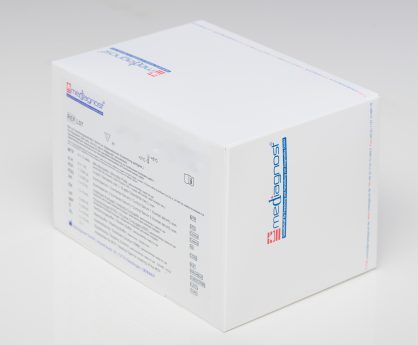IGF-II ELISA Assay Kit
The IGF-II ELISA Assay Kit is For Research Use Only
Size: 1×96 wells
Sensitivity: 0.06 ng/ml
Ranage: 0.06-3636 ng/ml
Incubation Time: 3 hours
Sample Type: Serum, Plasma, urine, saliva and cell culture medium
Sample Size: 10 µL
Product is manufactured by Mediagnost
Assay Notes:
The standards of the ELISA E30 are human IGF-II in concentrations 0.45; 1.5; 3; 5.63 and 9 ng/ml. The assay range covers the range to 2400 ng/ml. By varying the sample dilution this can be adapted to the special individual requirements. The Eagle Biosciences IGF-II ELISA Assay Kit is calibrated against the International Standard: WHO NIBSC 96/538.
Assay Principle
The Eagle Biosciences ELISA for IGF-II is a so-called Sandwich-Assay. It utilizes two specific and high-affinity antibodies for this protein. The first antibody, immobilized on the microtiter plate, and the added second biotinylated antibody are binding the IGF-II in the sample. The Streptavidin-Peroxidase Enzyme Conjugate subsequently binds to the complex. In the closing substrate reaction, the turn of the colour will be high specific catalysed, quantitatively depending on the IGF-II-level of the samples.
IGF-II-IGFBP complex is dissociated by dilution in an acidic buffer. IGFBPs are blocked by IGF-I excess, thus allowing the measurement of free IGF-II. With this method, the IGFBPs are not removed, but their function and therefore their interference in the assay is neutralized. Due to the low cross-reactivity of the IGF-II antibody with IGF-I, excess IGF-I does not disturb the interaction of the first antibody with IGF-II.
Related Products
IGF-I ELISA Assay Kit
Human IGFBP-1 ELISA Assay
IGFBP-6 ELISA Assay Kit


